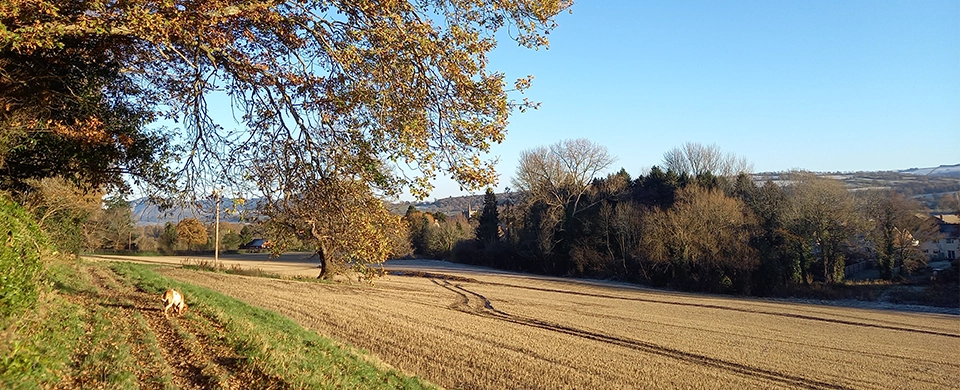The countryside is not just for the privileged few
I have to admit I’ve always been a fair-weather walker. You might say (pun alert) icy weather leaves me cold, but lately I haven’t had much choice. However reluctant I am to step outside I now have a dog who lets me know in no uncertain terms that it’s time to brave the elements.
As runners often say, the hardest part of training is getting through the door. Luckily, I’m literally a stone’s throw away from some great footpaths. It’s less than fifty metres down a lane to the footbridge that takes me and Alda over a stream and into open fields flanked by woods.
Alda is a Bracco Italiano, a pointer who thrives on chasing birds in open country. Walking her around residential streets on a lead isn’t much good for her or pleasant for me. So, it’s just as well the farmer who owns the land across the stream is accommodating towards local walkers. He seems relaxed not only about people making the most of designated rights of way but also about the use of other paths in the woods and the tracks that run through his fields. After a morning at the keyboard, I’m grateful for a walk to help me process what I’ve written and mull over some new ideas.
Sadly, some other landowners in the area don’t share his walker-friendly attitude. On moving to Guilsfield near Welshpool three years ago, my wife and I explored the surrounding countryside to find the best places for walking, which was one of the main reasons we’d chosen to move here from Cardiff.
From looking at the Ordnance Survey maps, there seemed to be plenty of options. But we soon discovered that six local paths shown as rights of way were fenced off – three by farmers, two for private equestrian purposes and one by a garden centre. This meant that we either had to use the lanes – and dodge traffic – or not access those areas at all.
Blocking public rights of way is, of course, unlawful. It is, however, very common. Ramblers Cymru estimates that about half of the 20,750 miles of public footpaths in Wales are inaccessible, either because they have been deliberately blocked or through neglect. Their advice to walkers who find fences stopping them from using a footpath is to take a photograph and send it with the location details to the countryside department of their local authority. In my case, that’s Powys County Council, which has a ‘definitive map’ of rights of way on its website that shows all the paths around Guilsfield, including the six I’ve found to be blocked.
However, while reporting the problem is relatively easy, it doesn’t mean that anything will be done about it right away. Local authorities have the power to enforce rights of way, but they lack the resources to tackle all the issues raised immediately and, where landowners are resistant, legal action takes time. And that’s just the first step: even once enforced, there is still the challenge of clearing obstacles and installing signage, gates and stiles.
The Welsh Government has declared our footpaths a national asset, but Ramblers Cymru says that needs to be matched by funding to make it a reality. They’re calling for “fair funding for path maintenance and improvements, equivalent to at least 10% of Active Travel budgets”. That would require a nearly four-fold increase from the current differential of 54p per person spent on public rights of way compared to £19.35 on Active Travel. They also want all local authorities in Wales to be required to survey their local paths and report on them in a consistent way so that the problems can be more easily identified and tackled.
The case for these changes is compelling. Firstly, there are the obvious health benefits of making it easier for people to walk in the countryside. This isn’t only a matter of step count – which can be achieved in a gym – it’s also good for us to breathe the fresh air and take a break in a tranquil setting from the stresses of work and urban life.
Secondly, more and better footpaths – around and between villages, towns and suburbs – will mean more people can leave their car at home for the shorter journeys to work or the shops, thus helping to reduce carbon emissions. And, thirdly, the selfish landowners who block paths are putting an unfair burden on those who do the right thing and creating a situation where some paths are over-used.
When I was a student in Sheffield in the 1970s, people used to talk with civic pride about the 1932 mass trespass on Kinder Scout when hundreds of ramblers from both sides of the Pennines defied gamekeepers to demand the ‘right to roam’. Five of them were sent to prison, but public support for what they did led, in 1949, to the National Parks and Access to the Countryside Act.
Today, once again, we need to assert the right to roam. Too many of our footpaths are in danger of being lost forever through neglect, lack of funding and the actions of those who think the countryside is for a privileged few. Living in Guilsfield has made me much more aware of how important our rights of way are. We owe it to ourselves and future generations to do our bit to make more of them accessible.
Steve Howell
This article was first published by Nation Cymru on Saturday 24 December.
Steve Howell is the author of two novels, Over The Line and Collateral Damage, and a book on the 2017 General Election, Game Changer.
Order a paperback copy of his latest novel, Collateral Damage, for the special offer of £8.00 including UK post and packing. ORDER NOW
Order a Kindle version of Collateral Damage at £2.99. ORDER NOW

